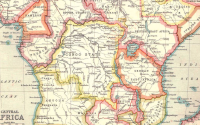2 February 2005
 Photo: AFPClick to enlarge Photo: AFPClick to enlarge |
The scale of these impacts -- the theme of the second day of the major scientific forum on global warming -- varies according to how quickly fossil fuel pollution is tackled, how fast the world's population grows and how well countries can adapt to climate shift.
But a common expectation is that widespread misery is lurking, a few decades down the road.
According to a study quoted by Rajendra Pachauri, chairman of the UN's top scientific authority on climate change, by 2050 as many as 150 million "environmental refugees" may have fled coastlines vulnerable to rising sea levels, storms or floods, or agricultural land that became too arid to cultivate.
In India alone, there could be 30 million people displaced by persistent flooding, while a sixth of Bangladesh could be permanently lost to sea level rise and land subsidence, according to the study.
Pachauri's body, the Intergovernmental Panel on Climate Change (IPCC), estimated in 2001 that by 2100, temperatures would rise by between 1.4 C (2.5 F) and 5.8 C (10.4) compared to 1990 levels, driven by atmospheric carbon pollution which stokes up heat from the Sun.
The mean global sea level would rise by between nine and 88 centimetres (four and 35 inches).
Those increases depend on whether carbon dioxide (CO2), doubles or nearly quadruples from the pre-industrial levels of 280 parts per million (ppm).
Global warming will also add significantly to Earth's worrisome water problems.
Already around 1.4 billion people live in water-stressed areas, a term defined as having less than 1,000 cubic metres (35,000 cubic feet) of water per person per year, said Nigel Arnell of the Tyndall Centre for Climate Change Research at Britain's University of Southampton.
Most of them live in southern and southwest Asia, the Middle East and the Mediterranean.
By the 2050s, water availability in these water-stressed regions -- but also in parts of central, north and south America -- may be further crimped because of changed rainfall patterns.
Between 700 million and 2.8 billion people in such areas will be affected, depending on population growth and the pace of temperature rise.
Sari Kovats of the London School of Hygiene and Tropical Medicine put forward a study co-authored by four World Health Organisation (WHO) scientists that gives a snapshot of global health problems caused by climate change.
Between the 1970s -- when temperatures first rose significantly -- and the year 2000, climate change cost around 150,000 lives from malnutrition, diarrhoea, malaria and floods.
That tally will "approximately double" by 2020, mainly because of diarrhoea, which is propagated easily in floods, and hunger, Kovats said.
The basis for this calculation is "business as usual," in other words, no controls are put on carbon pollution, causing Earth's temperature to reach some four C (7.2 F) higher at the end of this century when compared with 1990.
"Climate change will bring some health benefits," but these will mainly go to northern countries, where fewer people will die of cold and crop yields will be better, his study said.
Overall, these benefits will be hugely outweighed by increased disease and malnutrition.
Bill Hare, a former Greenpeace campaigner who is visiting scientist at the Potsdam Institute for Climate Impact Research in eastern Germany, said a two C (3.6 F) rise seemed to be a key threshold.
"Above two C, the risks increase very substantially, involving potentially large extinctions or even ecosystem collapses, major increases in hunger and water shortage risks as well as socio-economic damages, particularly in developing countries," said Hare.
The conference wraps up on Thursday with a set of conclusions about the current state of knowledge about the dangers of global warming. The document will be submitted to Group of Eight (G8) policymakers and the IPCC for consideration in its next big report, due out in 2007.






